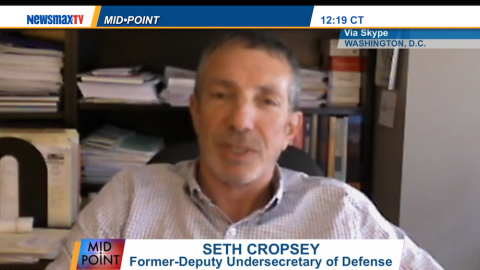While the net effect of President Barack Obama's hands-off foreign policy won't be known for years, what's clear right now is that his attitude toward U.S. power is unprecedented for a U.S. commander in chief, a Hudson Institute scholar who served in two Republican administrations told Newsmax TV on Monday.
"I think what is important and unique about this president is that he holds a view of America's role in the world that is different from his predecessors," Seth Cropsey, former deputy undersecretary of defense under Presidents Ronald Reagan and George H.W. Bush, told "MidPoint" host Ed Berliner.
Cropsey said Obama's preference for joint diplomacy and political pressure over military presence is on display in the effort to sanction Russia for its belligerence toward Ukraine.
"Have sanctions worked? Well, judge for yourself," said Cropsey. "Malaysian plane falls out of the sky, Russian troops massing on the border. Sanctions may have done something or other, but they haven't stopped the Russians from their military ambitions in Ukraine."
With U.S.-Russia relations headed toward a low reminiscent of the Cold War, Cropsey said the administration should be prepared for the possibility of a resumption of some of that era's tensions.
He cited Cuba as an example, saying that while "Cuba is not the country that it was during the Cold War," the possibility exists that the economically ailing communist holdout could again seek common cause with its old benefactor Russia.
"I think that relations in Cuba should be looked at in those terms," said Cropsey.
But Cropsey suggested the president's approach to U.S. military posture indicates a different worldview.
Obama's first two defense secretaries, Robert Gates and Leon Panetta, both told him things he didn't want to hear— specifically, "that the massive kinds of defense budget cuts that Obama was thinking about would leave the military force hollow," said Cropsey.
"And so, when Panetta left, the president found a senator who was not going to offer that kind of advice, [current Secretary of Defense] Chuck Hagel," said Mehlman.
"In that sense, the president's getting exactly what he wants," said Mehlman.
Whether the advice leads to disaster is an open question.
"There are so many regional conflicts that are ignited, or in the process of flaring up, around the world," siad Mehlman. "If some of these start to connect . . . that would be a disaster of a much greater magnitude than what's happened to Iraq.
"With two years and five months left in the administration, it's simply too early to tell," he said.



















